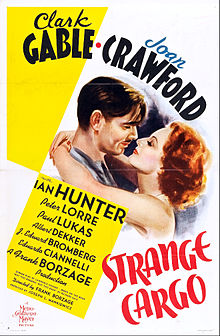Strange Cargo (1940 film)
| Strange Cargo | |
|---|---|

Original theatrical poster
|
|
| Directed by | Frank Borzage |
| Produced by | Joseph L. Mankiewicz |
| Written by | Lawrence Hazard |
| Based on |
Not Too Narrow, Not Too Deep by Richard Sale |
| Starring |
Joan Crawford Clark Gable Peter Lorre |
| Music by | Franz Waxman |
| Cinematography | Robert Planck |
| Edited by | Robert J. Kern |
| Distributed by | Metro-Goldwyn-Mayer |
|
Release date
|
|
|
Running time
|
113 minutes |
| Country | United States |
| Language | English |
| Budget | $1,252,000 |
| Box office | $1,924,000 |
Strange Cargo is a 1940 American romantic drama film by Metro-Goldwyn-Mayer, directed by Frank Borzage and starring Joan Crawford and Clark Gable in a story about a group of fugitive prisoners from a French penal colony. The screenplay by Lawrence Hazard was based upon the 1936 novel, Not Too Narrow, Not Too Deep, by Richard Sale. The film was produced by Joseph L. Mankiewicz and was the eighth and last film pairing of Crawford and Gable. The supporting cast includes Peter Lorre.
Julie (Crawford), a cafe entertainer in a town near a French penal colony, meets Verne (Gable), a prisoner on wharf duty. Verne escapes and goes to Julie's room, but is apprehended after M'sieu Pig (Peter Lorre) reports him, and he is returned to prison. Julie is fired for consorting with a prisoner. At the prison, Moll (Albert Dekker) has masterminded a jailbreak and takes Cambreau (Ian Hunter), Telez (Eduardo Ciannelli), Hessler (Paul Lukas), Flaubert (J. Edward Bromberg), and Dufond (John Arledge) with him.
Verne joins the escapees, taking Julie with him. The gentle Cambreau (a Christ figure) exerts a spiritual influence over the others, often reading from and quoting the Bible. As they trek through the jungle, most die with only Verne, Julie, Hessler, and Cambreau surviving the ordeal (Hessler--a Judas figure--disdains Cambreau's salvation and is last seen slinking off into the night, knowing as a gale arises that there is no turning back.) Verne initially scoffs at Cambreau's spirituality, but saves him from drowning (as Cambreau clings to driftwood---again, as a Christ figure on Calvary's cross) and penitently decides to return to the prison to finish his sentence. Julie has grown to love Verne and promises to wait for him.
...
Wikipedia
